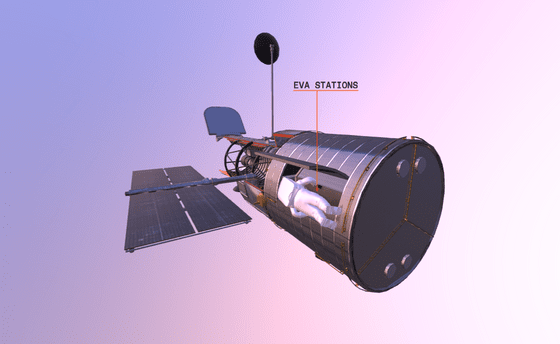In its more than 30 years of operation, the Hubble Telescope has been remodeled by astronauts multiple times.

NASA Made the Hubble Telescope to Be Remade - IEEE Spectrum
https://spectrum.ieee.org/hubble-space-telescope-re-invention
The Hubble Space Telescope's major systems were housed in a wedge-shaped equipment bay that astronauts could open from the outside, and maintenance workstations on the exterior gave astronauts quick access to vital telescope components.
Between 1993 and 2009, 16 astronauts replaced all major components of the Hubble Space Telescope except for the telescope tube and body during five missions , increasing the telescope's power supply by 20% and its light-gathering ability by 300%.
Below is an example of a remake that was actually done on the Hubble Space Telescope. The Hubble Space Telescope was originally equipped with six gyroscopes that could control its attitude by rotating at 19,200 times per minute, but the pressurized oxygen used for lubrication corroded the wires used in the early gyroscopes. So in 2009, astronauts installed nitrogen-based replacements, and as of 2024, two gyroscopes are still fully functional. According to NASA, there is a 70% chance that at least one will still be working in 2035.

The Hubble Space Telescope was originally equipped with silicon solar panels, but after two rounds of work, they have been replaced with gallium arsenide alternatives at the time of writing. This allows for a 5,200W output, 20% more than the original solar panels, while still being one-third the size of the original.

The Hubble Space Telescope is powered by six nickel-metal hydride batteries with a combined capacity of 528 Ah, which lasted for 19 years, contrary to initial expectations that they would last five years. These batteries were replaced in 2009, and NASA expects them to continue operating into the 2030s.

The 2.4m primary mirror is one of the few components of the Hubble Space Telescope that has remained untouched since launch, although many parts have been replaced. However, optical systems have been added to the imaging instrument to correct

The Hubble Space Telescope's main computer was last upgraded in 1999 and has been using Intel 486 ever since. According to NASA, it shouldn't have the smaller, more densely packed, cutting-edge processors because stray radiation from space could corrupt the signals on its circuits.

Initially, the Hubble Space Telescope used

To replace these parts, astronauts will rest their feet on 38 footrests installed along the outside of the telescope.

in Science, Posted by log1r_ut